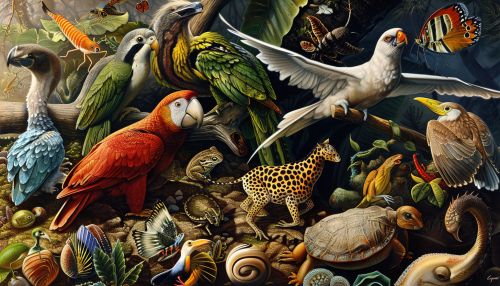Evolutionary Forces
Introduction
Evolutionary forces, also known as evolutionary processes, are mechanisms that drive changes in the genetic composition of populations over time. These forces include mutation, gene flow, genetic drift, and natural selection. Each of these forces plays a unique role in shaping the genetic diversity and adaptability of organisms.


Mutation
A mutation is a change in the DNA sequence of an organism's genome. Mutations are the primary source of genetic variation, providing the raw material for evolution. They can occur spontaneously or be induced by external factors such as radiation or chemicals. Mutations can be beneficial, neutral, or deleterious depending on their effects on an organism's fitness.
Types of Mutations
There are several types of mutations, including point mutations, insertions, deletions, and duplications. Point mutations involve a change in a single base pair, while insertions and deletions involve the addition or removal of one or more base pairs. Duplications involve the repetition of a segment of DNA.
Role in Evolution
Mutations play a crucial role in evolution by introducing new genetic variation into populations. This variation can lead to new traits and increased adaptability. However, most mutations are neutral or harmful, and only a small fraction are beneficial.
Gene Flow
Gene flow is the transfer of genetic variation from one population to another. It can occur through various mechanisms, such as migration, interbreeding, or the exchange of pollen between plants. Gene flow can increase genetic diversity within populations and promote adaptation to new environments.
Mechanisms of Gene Flow
There are several mechanisms of gene flow, including migration, interbreeding, and pollen transfer. Migration involves the movement of individuals from one population to another, while interbreeding involves the mating of individuals from different populations. Pollen transfer, which is common in plants, involves the movement of pollen from one plant to another.
Role in Evolution
Gene flow plays a significant role in evolution by introducing new genetic variation into populations and preventing the divergence of populations into separate species. It can promote adaptation to new environments and increase genetic diversity.
Genetic Drift
Genetic drift is a random change in the frequency of alleles in a population due to chance events. It can lead to the loss of genetic variation and the fixation of certain alleles. Genetic drift is particularly significant in small populations, where chance events can have a larger impact.
Types of Genetic Drift
There are two main types of genetic drift: the founder effect and the bottleneck effect. The founder effect occurs when a new population is established by a small number of individuals, leading to a reduction in genetic variation. The bottleneck effect occurs when a population undergoes a severe reduction in size, leading to a loss of genetic variation.
Role in Evolution
Genetic drift plays a key role in evolution by causing random changes in allele frequencies. This can lead to the loss of genetic variation and the fixation of certain alleles. However, genetic drift can also promote adaptation in certain scenarios, such as when beneficial mutations become fixed.
Natural Selection
Natural selection is the process by which individuals with advantageous traits are more likely to survive and reproduce, leading to an increase in the frequency of those traits in the population. Natural selection is the primary driver of adaptive evolution and plays a crucial role in shaping the diversity of life on Earth.
Mechanisms of Natural Selection
There are several mechanisms of natural selection, including directional selection, stabilizing selection, and disruptive selection. Directional selection favors one extreme phenotype, leading to a shift in the population's phenotype distribution. Stabilizing selection favors intermediate phenotypes, reducing phenotypic variation. Disruptive selection favors extreme phenotypes, leading to the formation of two or more distinct phenotypes.
Role in Evolution
Natural selection plays a central role in evolution by promoting the survival and reproduction of individuals with advantageous traits. This leads to an increase in the frequency of those traits in the population and drives adaptive evolution.
Conclusion
Evolutionary forces are key mechanisms that drive changes in the genetic composition of populations over time. Through mutation, gene flow, genetic drift, and natural selection, these forces shape the genetic diversity and adaptability of organisms, playing a crucial role in the process of evolution.
